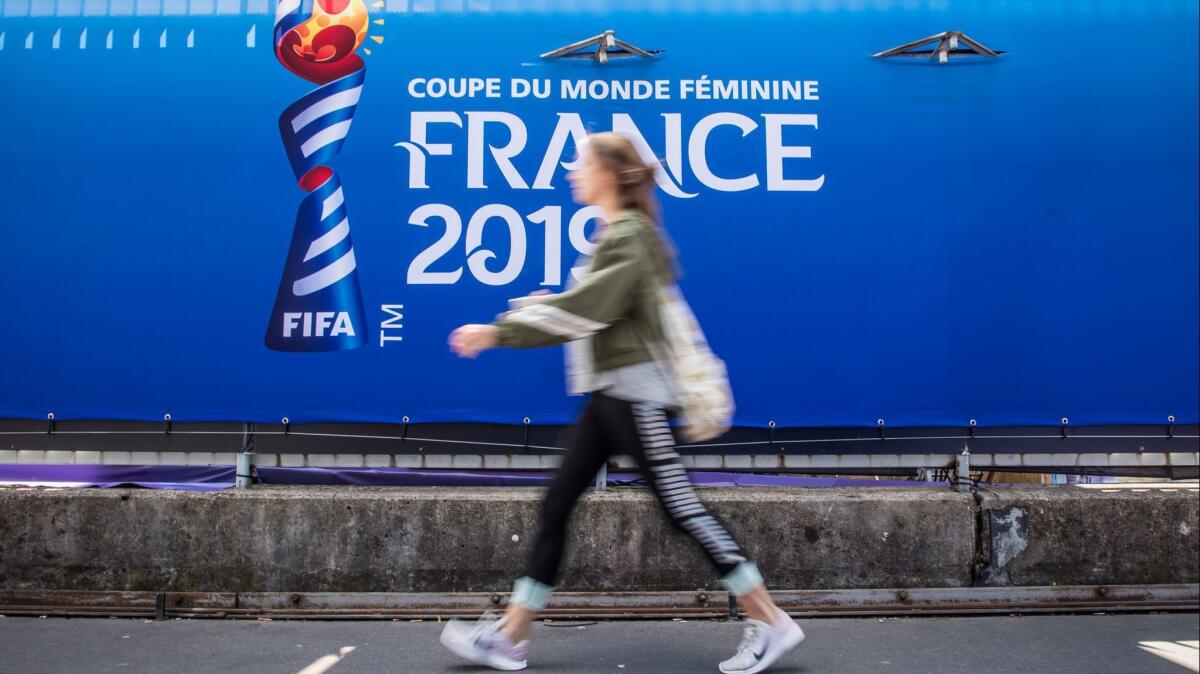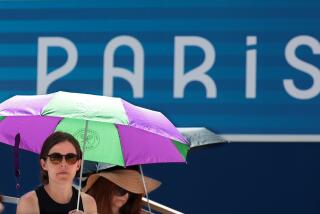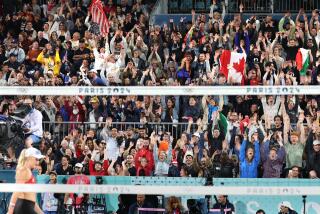Women’s World Cup fights for attention in bustling France

Reporting from paris — The FIFA Women’s World Cup kicks off Friday in Paris. But you might not know it here.
There is little signage and even less buzz about the tournament in the neighborhoods around Parc des Princes, site of the opening game.
There were plenty of distractions.
The French Open tennis tournament, taking place less than a half-mile from the soccer stadium, has reached the semifinals. On Thursday many world leaders, including President Trump, were just 120 miles away in Normandy, marking the 75th anniversary of D-day. Even L’Equipe, the French daily which covers nothing but sports, ran a men’s soccer story on its cover.
For women’s soccer, meanwhile, the battle for relevance and respect continued with a sigh and a shrug even on the eve of its quadrennial celebration.
“In Paris, it’s a little bit difficult,” said French coach Corinne Diacre, whose team opens the tournament against South Korea. “This is huge city. It’s very difficult to gauge the atmosphere.
Sign up for our weekly soccer newsletter »
“It’s the World Cup. It’s been the first time we’ve seen the people. We’ve tried to stay in our little bubble for as long as possible, but [Friday] when we get to the stadium it will be a completely different atmosphere.”
Organizers are counting on that, since Friday’s opener was one of three that sold out hours after tickets went on sale last spring. The semifinals and final in Lyon have also sold out, as have group-play matches in Valenciennes, Rennes and Le Havre.
More than 960,000 tickets have been sold for the 52 matches, just below the 1-million mark organizers had hoped for. So if the tournament has proven a tough sell in Paris, in the eight host cities outside the capital the reception has been better.
The defending champion U.S. will play its first game Tuesday, facing Thailand in Reims. The 24-team field is divided into six groups, with the top two teams in each group, plus the four best third-place teams, advancing to the knockout round.
“The signage within one host city is one thing. We’ve got other cities across France that are doing a tremendous job supporting the tournament,” said Jean-Francois Pathy, director of marketing services for FIFA. “Of course we can always do better. But it’s a tremendous improvement from where we’ve been in the past.”
But the buildup to this World Cup, more than any other, has shown the women are tired of improvement and want equality instead. The top-ranked U.S. team is suing its federation over inequities in pay and working conditions compared to the men’s team, and they’re not alone.
Since the last Women’s World Cup in Canada, Nigeria’s players staged a sit-in over unpaid salaries and bonuses. National teams in Argentina, Ireland, Denmark, Australia, Puerto Rico, Norway and Canada have waged public campaigns seeking more money and support from their federations.
Jamaica didn’t even have a team five years ago after its federation pulled its funding. But with support from Cedella Marley, the daughter of the late singer Bob Marley, the Reggae Girlz reformed and will be playing in their first World Cup this month.
FIFA, the world governing body for soccer, has been slower to fully embrace the women’s game. It didn’t have a women’s division until 2016 and didn’t have a coherent strategy for strengthening the foundation of the game until October.
While the $30 million in prize money it is paying the teams in this tournament is double the purse from 2015, it’s just a fraction of the $400 million the 32 men’s teams split at their World Cup last summer.
“Women’s football is very young,” Diacre said through an interpreter. “We know within the different nations there are discrepancies. Not everyone is on the same page yet.
“Let’s not run before we can walk. Things are improving. There will be comparisons between men and women, between salaries. It will always be a sticking point, even in society away from football it’s a point of discussion.”
France was going to change that, appointing Laura Georges, a former national team star, as general secretary of the French soccer federation and making her the face of its World Cup.
“We want to grow the attention of women’s football. We want to be the leaders,” Georges said.
The timing is certainly right. France’s victory in the men’s 2018 World Cup, its second in two decades, touched off a football frenzy at home. Now its women’s team, ranked fourth in the world, has a chance to make the country the first to hold the men’s and women’s World Cups at the same time.
The men won their first title in 1998, the only other time in the modern era that a World Cup was played in France.
“It’s a dream to play a World Cup game at home,” captain Amandine Henry said through an interpreter. “It’s positive pressure. We know how we are going to be able to deal with this moment.
“I’m from the 1998 generation. They made us all dream in France. We want to go through these same emotions.”
[email protected] | Twitter: @kbaxter11








